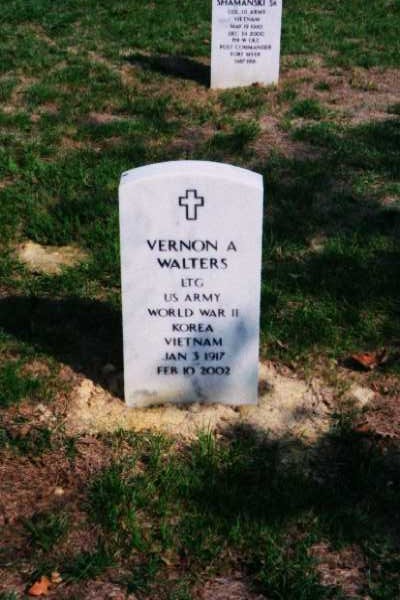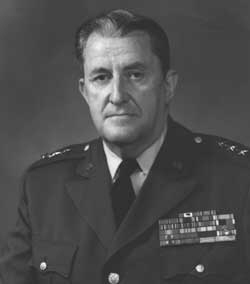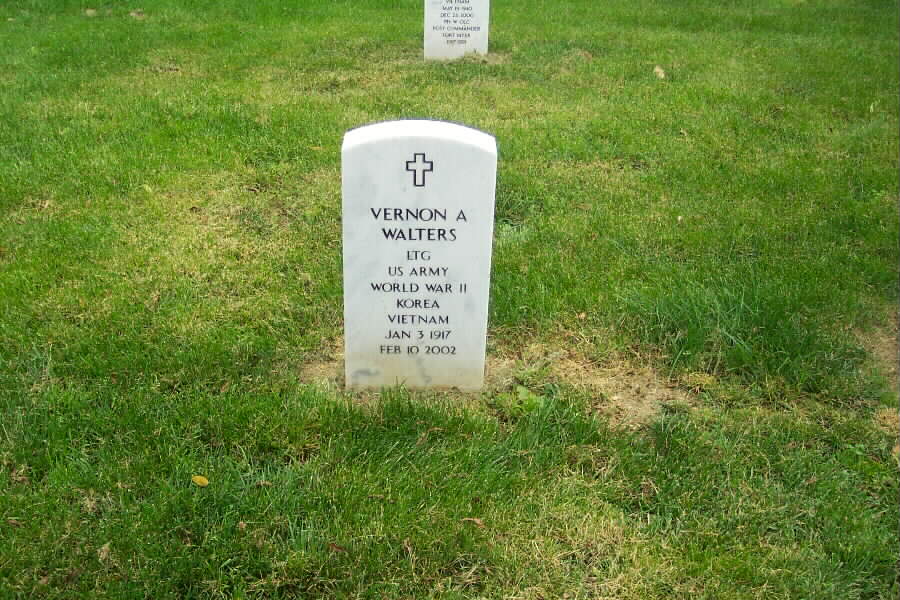Statement by Director of Central Intelligence
George J. Tenet on the Death of
Former Deputy Director of Central Intelligence Vernon Walters
I was deeply saddened to learn of the death of Vernon Walters. An honest patriot of enormous talent, his was an exceptionally rich life of service to country and humanity. A natural leader, he rose to excellence in every profession he entered—soldier, intelligence officer, diplomat.
To the men and women of the Central Intelligence Agency, Vernon Walters is more than a wise hand who guided our organization in difficult times. With his remarkable knowledge of the world, and his passion to see it changed for the better, he will remain for us an example of what the very best in our field must always be.
From A Contemporary Press Report: February 15, 2002
Vernon A. Walters, 85, Former Envoy to U.N.
Vernon A. Walters, a former ambassador to the United Nations and Deputy Director of Central Intelligence, died Sunday in West Palm Beach, Florida. He was 85.
General Walters occupied a front- row seat at an array of historic events in the post-World War II era, as a translator, adviser, administrator and diplomat. He spoke seven or eight languages, five of them fluently, and served part time as an interpreter to five presidents.
His fluency in languages helped throughout his career. In “Silent Missions,” his 1978 memoir, General Walters described a conversation he had at a reception in 1964 with the Soviet ambassador to Brazil. The ambassador complained to General Walters, then the United States military attaché in Brazil, that Americans always wanted to converse in English. Even when they try to learn a foreign tongue, he explained, they suffer because they do not have the Slavs’ ear for languages.
General Walters switched to Russian in reply, asking him if he would rather speak Portuguese instead. The ambassador, embarrassed, answered, “Walters, you may be good soldier, but diplomat you are not.”
Vernon Anthony Walters was born in New York City on January 3, 1917, and attended Stonyhurst College in England. He joined the United States Army in 1941, and served in North Africa and Italy during World War II, retiring in 1976 as a Lieutenant General.
From 1955 to 1960, he was a staff assistant to President Eisenhower, acting as interpreter for the President, Vice President and senior diplomatic and military officials.
Appointed by President Nixon, General Walters was deputy chief of the C.I.A. from 1972 to 1976. Just weeks after Mr. Nixon sent him to the agency, the White House tried to involve the C.I.A. in the Watergate scandal that eventually forced Mr. Nixon’s resignation.
According to later Congressional testimony by John W. Dean 3d, the President’s counsel at the time, Mr. Nixon had picked General Walters for the job in order to have a “good friend” in the intelligence agency.
Two Nixon aides, H. R. Haldeman and John D. Ehrlichman, asked General Walters to caution the Federal Bureau of Investigation to limit its inquiries lest they compromise C.I.A. operations. “It simply did not occur to me that the chief of staff of the President might be asking me something that was illegal or wrong,” Mr. Walters wrote in his memoir.
But on orders from his superior, Richard M. Helms, the director of central intelligence, the general rescinded his advisory to the F.B.I. According to General Walters, Mr. Dean subsequently asked him repeatedly to pay off the Watergate burglars with secret C.I.A. funds, but he refused to do so and threatened to resign publicly if there was one more such call.
In 1981, President Reagan offered General Walters the job of roving ambassador, which he accepted. Finally, he served as ambassador to the United Nations from 1985 to 1988, and as ambassador to West Germany from 1989 to 1991.
At the time of the appointment of General Walters as ambassador to the United Nations, William E. Colby, the former director of central intelligence, said: “When he worked for me, he was fearless in expressing his views and totally loyal once a decision was made. I used him as a total alter ego.”
In 1991, when asked what kept him going into his 50th year of service to the country, General Walters replied, “My perception that the United States was the only real chance freedom had to survive in the world.”
He had many opportunities in his career to witness the making of history. He was W. Averell Harriman’s aide in the early years of the cold war, accompanied President Truman to a meeting with an insubordinate General Douglas MacArthur during the Korean War and shuttled with President Eisenhower to a series of summit meetings, held in Geneva and White Sulphur Springs, West Virginia, among other places.
As translator for Vice President Nixon during his good-will tour of Latin America in 1958, General Walters was cut in the mouth by broken glass when a mob stoned their car in Caracas. Later, as a military attaché in Paris, General Walters is remembered for borrowing the private plane of President Georges Pompidou to smuggle Henry A. Kissinger in and out of France for clandestine meetings with
Le Duc Tho of North Vietnam.
“He was great as our James Bond, getting us in and out secretly, even giving us code names,” said Winston Lord, former president of the Council on Foreign Relations, who accompanied Mr. Kissinger to the secret talks with the Vietnamese.
General Walters, a bachelor, leaves no immediate survivors. He is to be buried with full military honors at Arlington National Cemetery early next month.
February 14, 2002:
Vernon A. Walters, 85, a retired Army Lieutenant General, intelligence officer and diplomat who was a deputy director of the Central Intelligence Agency and ambassador to the United Nations, died February 10, 2002, at Good Samaritan Medical Center in West Palm Beach, Florida. The cause of death was not reported.
General Walters spent his career in the shadowy world of political and strategic secrets. He was variously described as the quintessential quiet American and as the U.S. version of James Bond, an idea he dismissed as absurd. He believed the United States must be able to project its military power in credible ways, but he also believed that the purpose of diplomacy is making friends. He told an interviewer that people who doubted that serious diplomatic business was conducted at cocktail parties had never been to one.
A linguist, he spoke French, Spanish, Italian, German, Dutch, Portuguese and Russian. He translated for President Dwight D. Eisenhower and French President Charles de Gaulle as the two sat in their bathrobes in front of a fire at Rambouillet Palace outside Paris and for Vice President Richard M. Nixon when his limousine was attacked by a mob in Caracas, Venezuela, in 1958.
In the 1960s, Gen. Walters had successive assignments as U.S. military attaché to Italy, Brazil and France. He also served in Vietnam and regarded the U.S. effort there a “battlefield of freedom” and “one of our noblest fights.”
He was deputy director of the CIA from 1972 to 1976. For a period in 1973, he was acting director of the agency. During that time, he successfully resisted efforts by John Dean, the White House counsel, to involve the CIA in efforts to cover up the Watergate scandal that led to Nixon’s resignation.
From 1981 to 1985, Gen. Walters was ambassador at large in the Reagan administration, a job in which he visited more than 100 countries. He was ambassador to the United Nations from 1985 to 1988 and then ambassador to Germany until 1991.
In a statement on General Walters’s death, CIA Director George J. Tenet described him as “an honest patriot of enormous talent” who led “an exceptionally rich life of service to country and humanity.”
“A natural leader, General Walters rose to excellence in every profession he entered,” Tenet said. “With his remarkable knowledge of the world, and his passion to see it change for the better, he will remain for us an example of what the very best in our field must always be.”
General Walters was born in New York. When he was 6, his family moved to Europe, and he grew up in Paris. He attended Stonyhurst College, a secondary school in England, but left at age 16 to work for his father. He never attended college.
His military career began when he was drafted into the Army in 1941. He was soon commissioned. During World War II, he served in North Africa and Europe.
In the immediate postwar years, he was an aide to General Mark Clark, the U.S. commander in Austria. At Clark’s recommendation, General George Marshall, the Army chief of staff, moved him onto his personal staff. This led to his going to White House under President Harry S. Truman and, later, under Eisenhower.
General Walters had an uncanny ability to be present at large events. As an aide to Truman, he was the note-taker when the president fired Douglas MacArthur during the Korean War. He was in Tehran in 1953 when the CIA staged a coup in support of the shah of Iran and in Brazil when a group of generals staged a coup in 1964.
He also was involved in secret negotiations between the United States and North Vietnam. He once had the task of smuggling Henry A. Kissinger, then Nixon’s national security adviser, into Paris. He did it by borrowing the plane of French President George Pompidou, an old friend.
In 1973, when the Palestine Liberation Organization killed two U.S. diplomats in Sudan, General Walters was ordered to make it clear to the PLO that the United States would not stand for such behavior. A meeting with PLO representatives was arranged at the palace of King Hassan of Morocco. Walters had known the king since World War II, when he gave him a ride in a U.S. tank.
During the Carter administration from 1977 to 1981, General Walters was a private consultant to Environmental Energy Systems Inc., an Alexandria firm. In 1981, he was paid $300,000 for putting the company in contact with the right people in the Moroccan government for a $190 million tank-modernization deal. The deal eventually fell through.
General Walters also worked as a $1,000-a-day consultant for Basic Resources Services Inc., a Luxembourg-based consortium, on an oil deal in Guatemala.
General Walters wrote two books, “The Mighty and the Meek,” a series of profiles of famous people with whom he worked, and “Silent Missions,” an autobiography. In private, he was known as a gifted storyteller and mimic. Since retiring from the government he had lived in Palm Beach, Florida. He never married.
Ambassador Vernon Walters Dies at 85
Thursday February 14, 2002
WEST PALM BEACH, Florida – Retired Lieutenant General Vernon A. Walters, an aide to seven Presidents and a U.S. ambassador to the United Nations and Germany, has died. He was 85.
Walters died Sunday 10 February 2002) of undisclosed causes at Good Samaritan Medical Center in West Palm Beach.
The internationally decorated Army veteran had a long career in public service. He helped shape the Marshall Plan after World War II, served as deputy director of the Central Intelligence Agency during Watergate, briefed Henry Kissinger on the North Vietnamese during the Vietnam War and became a member of the NATO Standing Group.
“He rose to excellence in every profession he entered — soldier, intelligence officer, diplomat,” CIA Director George Tenet said Thursday.
“With his remarkable knowledge of the world, and his passion to see it changed for the better, he will remain for us an example of what the very best in our field must always be,” Tenet said.
Walters remained involved in government service into the early 1990s. Asked in an interview with The Associated Press in 1991 what kept him going after 50 years of service, the longtime Cold Warrior replied: “My perception that the United States was the only real chance freedom had to survive in the world.”
Longtime friend General Alexander Haig called Walters “a man of towering integrity” and “one of the most remarkable public servants I have ever known.”
Born in New York City, Walters’ family moved to Europe when he was 6. There he learned in French, Spanish, Italian and German. He later became fluent in Portuguese, Chinese and Russian.
Walters’ linguistic skills and photographic memory opened doors for him during his 35-year military career and later diplomatic work.
His translation of one speech by President Nixon drew the attention of French President Charles De Gaulle.
“He said to the President, ‘Nixon, you gave a magnificent speech, but your interpreter was eloquent,'” Haig said.
In the 1991 interview, Walters said one of his most memorable moments was a 1958 tour with then-Vice President Nixon to South America.
While driving past anti-U.S. protesters in Caracas, Venezuela, Nixon’s car was attacked by a shower of stones. One of the projectiles smashed Walters’ window, spraying him with glass and cutting him in the mouth.
According to Walters, Nixon told him, “Spit that glass out — you are going to have a lot more talking to do in Spanish for me today.”
Walters also worked for President Eisenhower as a staff assistant, arranged trips abroad for President Kennedy and served President Reagan as a diplomatic troubleshooter.
As an aide to President Truman, he was the note-taker when the president fired Douglas MacArthur during the Korean War.
He was in Tehran in 1953 when the CIA staged a coup in support of the shah of Iran and in Brazil when a group of generals staged a coup in 1964.
During secret negotiations between the United States and North Vietnam, he had the task of smuggling Kissinger, then Nixon’s national security adviser, into Paris.
Walters was deputy director of the CIA from 1972 to 1976 and acting director for a period in 1973.
From 1981 to 1985, he was ambassador at large in the Reagan administration, visiting more than 100 countries. He was ambassador to the United Nations from 1985 to 1988 and then ambassador to Germany until 1991.
Walters, who never married, is to be buried with full military honors at Arlington National Cemetery early next month.
WALTERS, VERNON A., LTG U.S. ARMY (Ret.)
On Sunday, February 10, 2002 of Palm Beach, Florida, and Arlington, Virginia. He is
survived by numerous nieces and nephews. Friends may call at the MURPHY’S FUNERAL HOME OF ARLINGTON, 4510 Wilson Blvd., on Monday, March 4, from 2 to 4 and 7 to 9 p.m. Mass of Christian Burial will be offered Tuesday, March 5 at 12:45 p.m. in Fort Myer Old Post Chapel. Interment Arlington National Cemetery with full Military Honors. It is suggested that memorial contributions be made in his name to Catholic Missions.

Michael Robert Patterson was born in Arlington and is the son of a former officer of the US Army. So it was no wonder that sooner or later his interests drew him to American history and especially to American military history. Many of his articles can be found on renowned portals like the New York Times, Washingtonpost or Wikipedia.
Reviewed by: Michael Howard


